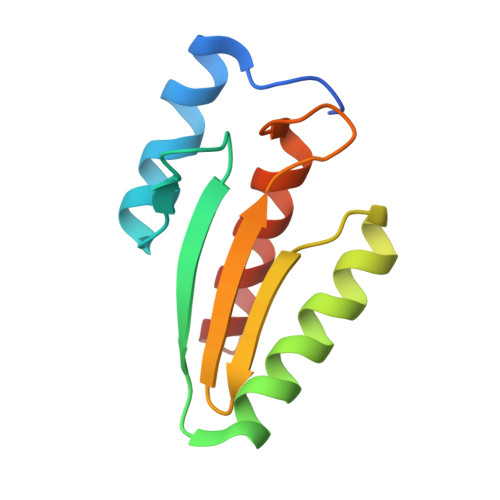Interactions with the Bifunctional Interface of the Transcriptional Coactivator DCoH1 Are Kinetically Regulated.
Wang, D., Coco, M.W., Rose, R.B.(2015) J Biological Chem 290: 4319-4329
- PubMed: 25538247
- DOI: https://doi.org/10.1074/jbc.M114.616870
- Primary Citation of Related Structures:
4WIL - PubMed Abstract:
Pterin-4a-carbinolamine dehydratase (PCD) is a highly conserved enzyme that evolved a second, unrelated function in mammals, as a transcriptional coactivator. As a coactivator, PCD is known as DCoH or dimerization cofactor of the transcription factor HNF-1. These two activities are associated with a change in oligomeric state: from two dimers interacting as an enzyme in the cytoplasm to a dimer interacting with a dimer of HNF-1 in the nucleus. The same interface of DCoH forms both complexes. To determine how DCoH partitions between its two functions, we studied the folding and stability of the DCoH homotetramer. We show that the DCoH1 homotetramer is kinetically trapped, meaning once it forms it will not dissociate to interact with HNF-1. In contrast, DCoH2, a paralog of DCoH1, unfolds within hours. A simple mutation in the interface of DCoH2 from Ser-51 to Thr, as found in DCoH1, increases the kinetic stability by 9 orders of magnitude, to τ(½) ∼ 2 million years. This suggests that the DCoH1·HNF-1 complex must co-fold to interact. We conclude that simple mutations can dramatically affect the dissociation kinetics of a complex. Residue 51 represents a "kinetic hot spot" instead of a "thermodynamic hot spot." Kinetic regulation allows PCD to adopt two distinct functions. Mutations in DCoH1 associated with diabetes affect both functions of DCoH1, perhaps by disrupting the balance between the two DCoH complexes.
- From the Department of Molecular and Structural Biochemistry, North Carolina State University, Raleigh, North Carolina 27695-7622.
Organizational Affiliation:
















